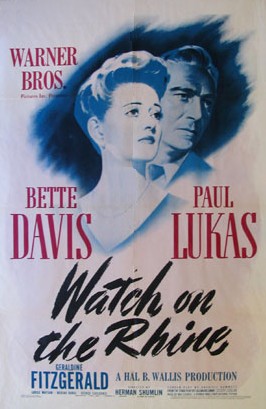
WATCH ON THE RHINE
US, 1943, 114 minutes, Black and white.
Paul Lukas, Bette Davis, Lucille Watson, George Colouris, Geraldine Fitzgerald, Beulah Bondi, Helmut Dantine.
Directed by Herman Shumlin.
A very patriotic film. It now appears somewhat talkative and dated. The play was written by Lillian Hellman,
in the forties - after having written such plays as The Children's Hour, The Little Foxes. It is interesting in view of Lillian Hellman’s private life and liaison with Dashiell Hammet, that he was the adaptor of her play for the screen.
Paul Lukas won an Oscar for his performance and is quite moving in the difficult role of the German patriot. Bette Davis, without many of her mannerisms, is convincing as the leading lady. Lucille Watson, always big and impressive on the screen, is good as her mother. George Colouris is an ugly Nazi villain.
There is much talk, the issues of the war are presented strongly. It is interesting to compare some of the themes and the activity of this German-American? family with episodes in Lillian Hellman's autobiography Pentimento and the episodes filmed in Julia, the autobiographical film starring Jane Fonda and Vanessa Redgrave.
1. The impact of the film during World War II, now? The validity of its message in its time, now? The work and reputation of Lillian Hellman and Dashiell Hammett? The prestige of the stars and Paul Lukas's Oscar? Satisfactory, anti-nazi propaganda? As reflecting American attitudes in the forties?
2. Production values: Warner Bros.' style, black and white photography, translation of successful stage play to the screen? The cast? Max Steiner's score?
3. The recreating of the pre-war attitudes towards Hitler - in Europe, the United States? The background of people escaping from Germany, anti-nazi reaction and plans for example the transfer of monies? The status of Spain in the late thirties after the Civil War? German activity and propaganda throughout the world - activity in the United
States? American detachment and seeming complacency? The need for America's involvement in World War II? Propaganda effect of the play and of the film?
4. The picture of German refugees and their plight - dangers in escaping from Germany, false passports? Ever present dangers of recapture? The road into the United States via Mexico? Seeing Mexico and the United States through the eyes of the German children? How well did the film fill in the background of the refugees - European fascism of the thirties, the American family and Sarah returning home? Kurt and his need for going to America? The bonds between Germany and the United States? The children and their German point of view, the journey through the desert, the arrival in Washington and the discovery of the American lifestyle as exemplified by the house? Settling in but bringing the questions and anguish of Europe with them? The absence from home by Sarah for so many years?
5. Kurt as hero - his integrity, concern about Nazi Germany, the set speeches he is given to make clear his point of view? Careful concern for his family and love for them? The transfer of the money? The suspicions of Count Teck? The fact that he was compelled to kill him and the explanation of his action and conscience? His return to Germany and the emotional impact of the farewell? Loving husband, father? A concerned man? The options open to him in the late thirties? Bette Davis's performance as Sarah ? loving wife, support, her way of life in Germany, the tensions of returning to America, the anguish with the background of espionage in Washington, her relationship with her mother and the rest of the family, her decisions as regards Kurt's going back to Germany and her support? Offering insight to the American audiences via the persona portrayed by Bette Davis?
6. The background of America especially in Washington, tradition, politics, society, wealth? The home and Fanny's running of the house? Her companion and her continual rousing on her? The place of the black servants? The sequences of shopping, work? An American lifestyle with the emphasis on freedom? The jolt to the American way of life to be interested in Europe, break out of parochial interests?
7. The family background and the romantic framework for the melodrama? The various generations: Fanny and her friends, manner, style? Kurt and Sarah and their settling to the American way of life? The Count and his wife and the affair?
8. The Count and his contacts, gambling? Favours and the Nazi group, information and espionage? His searching of Kurt's luggage, the pressure on him to give information? His being killed?
9. His wife and her relationship, her alienation from her husband, the morality and the complications with the espionage?
10. The build-up to the climax - life and death, moral decisions, the atmosphere of war for such decisions?
11. How persuasive these questions within the context of war? How well do they stand in the light of hindsight?